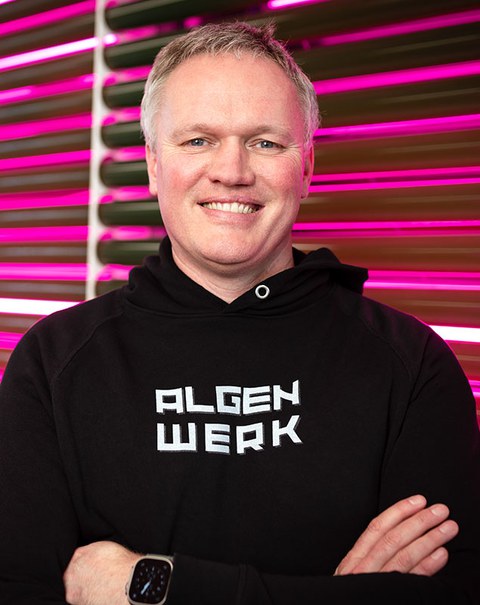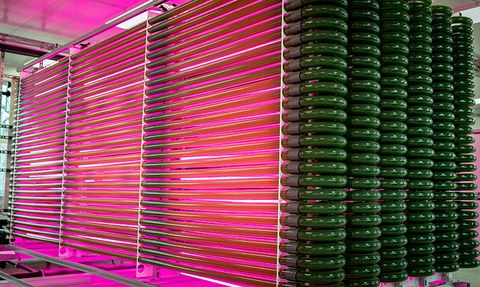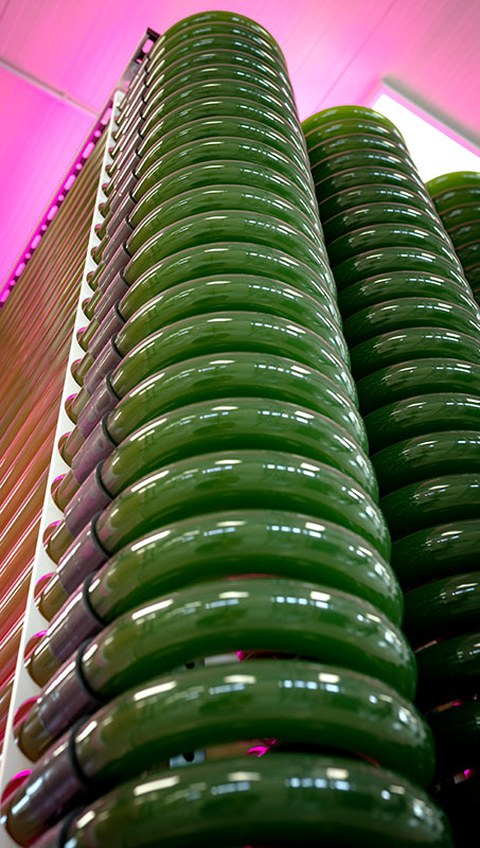Growing algae in pipes
Dagmar Möbius

Gunnar Mühlstädt is convinced that algae is our future.
Gunnar Mühlstädt originally wanted to study medicine. But while completing his civil service in a hospital, he realized that he would rather not become a doctor. However, the mechanical engineering graduate is still passionate about health and healthy living. He told Kontakt-online why he and his team are now producing algae in aquatic greenhouses.
Gunnar Mühlstädt lost interest in studying medicine when he realized during his mandatory alternative service that he was unable to remember the content of long package inserts. However, Mühlstädt, who is originally from the town of Rochlitz, had been interested in technology from an early age. In 1998 he came to TU Dresden, where he studied Mechanical Engineering with a specialization in building services engineering until 2004. The now 45-year-old wrote his graduate thesis on predictive heating control systems. “Today, we would call it AI. But back then, nobody was interested in smart homes,” explains Gunnar Mühlstädt.
Fascinated by transparent pipes with algae
That is why the mechanical engineering graduate with a sub-specialization in automation technology started working for the Swiss company Georg Fischer AG in 2006. A division of the international industrial corporation (GF Piping Systems) offers piping systems for the safe and environmentally friendly transport of liquids. Working for the global leader led him to his current passion: “I saw transparent pipes with algae and was fascinated.” But Gunnar Mühlstädt did not know much about algae at the time, so he began to study them.
Making a future fit for his grandchildren
He had been thinking for a long time about what his role in the world could be, what his legacy would be, and how he could do something sustainable. He did not just want to be earning money for a company. But edible algae? There are more than 400,000 species of these ancient plants worldwide. Few are well researched. “This is my future – our future,” he realized the more he learned about it. Making the food system fit for the future and his grandchildren while also providing a balanced diet became Gunnar Mühlstädt's mission. “But it needs to be done right,” he resolved – and he was nominated for the Saxon Founder’s Award in 2023. “The founding team’s business idea is ingenious, it fits the current trend of many customers to eat healthy and be sustainable,” praised Claudia Weber from the panel of judges at the Saxon State Ministry of Economics, Labor and Transport.

The team members work with the bioreactors, with the algae harvest or with the production of extracts.
“Still working with pipes”
The engineering graduate founded his company in 2016. “MINT Engineering [the name of the start-up] made it to COVID. Then our investor bailed out,” he relates. The company had to file for insolvency in 2021. “That's the case for many tech start-ups. Pilot projects are generally very difficult to finance, and it wasn't an easy time.” But Gunnar Mühlstädt has always looked ahead. “I'm all about the cause,” he says. “Giving up is not my strength.” In 2022, he founded a new company with the support of investors: Puevit GmbH produces the most efficient photobioreactors for cultivating microalgae in Dresden. The first three letters of the company name stand for the investor, his long-time business partner Alfred Pürstinger, and vit for vitality.
The healthy microalgae – in particular Sprirulina – grow in pipes. Two types of algae are currently approved as food. “We cultivate them using sophisticated technology and produce them fresh in our aquatic greenhouse. So in the end, I’m still working with pipes,” the managing director laughs.
Harvested every three days
The Pürstinger group of companies employs a total of around 150 people from various disciplines. Each day at the algae plant begins with a meeting to discuss the day's tasks. The five team members, plus three interns from TUD starting in October 2023, work with the bioreactors, harvesting the algae (every three days) or producing extracts. Research and development work is carried out in parallel. “Algae production is very development-oriented. We come up with technical solutions and also work with some of the chairs at TU Dresden.” The managing director is happy to show interested parties around the plant.
Networking and “just do it”’

The healthy microalgae grow in tubes.
Above all, Gunnar Mühlstädt praises his mechanical engineering studies at TUD, which developed skills that now help him every day: solving problems while under tight deadlines, being organized, getting to the point, and questioning things. “Could something be wrong? Clemens Feldmann, then a senior assistant, now Chair of Building Energy Systems and Heat Supply at TUD, taught us how to use common sense.” He is also in regular contact with Leon Urbas, Professor of Process Control Systems at TUD, Felix Krujatz, Markus Schubert and many other scientists who are part of the Marie Curie Network throughout Europe. “Networking has the advantage that we can often help researchers quickly, and they can help us in return. It's easy to move forward together. After all, unforeseen things do happen,” says Gunnar Mühlstädt. “Just do it” is his motto.
Giving back
That's exactly what he did when he recently came across the Deutschlandstipendium scholarship at a knowledge café. Gunnar Mühlstädt supports the initiative. At the time of the interview, he does not know which scholarship recipient will benefit from his sponsorship. But he knows exactly why he wants to involved: “I’d like to give something back. I was able to study for free and learned a lot. It's good for young people to get involved with the industry while they're studying. The funding, of course, and the institutional collaboration.”
Gunnar Mühlstädt is not sorry that he ended up studying mechanical engineering instead of medicine. His current job is a combination of engineering skills, sustainability, and healthy living. “I also found a wife who is a doctor,” he smiles.
Contact:
Gunnar Mühlstädt
Managing Director
Am Torfmoor 1c
01109 Dresden, Germany#
Phone: +49-351-8969-05-00
Email:
